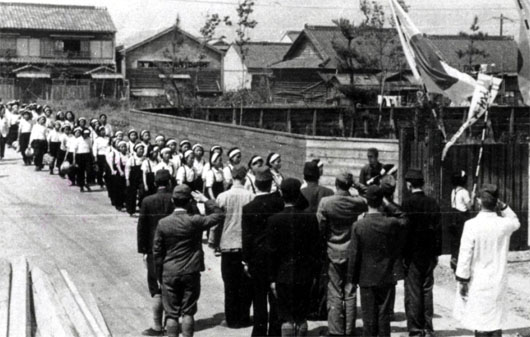Special to WorldTribune.com
 By Donald Kirk
By Donald Kirk
WASHINGTON ― Koreans have innumerable reasons to resent Japan’s sense of superiority and also every reason to get over it.
Astonishingly, apologists for North Korea deride U.S. attempts at persuading South Korean and Japanese leaders to get along with each other. It’s as though they really think South Korea and Japan should go to war ― or at least avoid contact ― while favoring North-South reconciliation on terms favorable to the North.

The logic is that Japan has been so harsh on Korea that a united Korea should stand firmly against its one-time colonial overlord, at least until Japan reverses its conservative policies. Naturally, these pro-Northers also call for doing away with separate U.S. alliances with Japan and South Korea while offering no criticism of the North’s enormous military establishment or its nuclear and missile programs.
From the South Korean perspective, however, all that’s no reason for people on both sides of the East Sea, a.k.a. the Sea of Japan, to go on letting their complexes get in the way.
Korea ― that is, South Korea ― and Japan need each other. Defense against North Korea may not seem paramount amid President Moon Jae-In’s quest for inter-Korean reconciliation, but Kim Jong-Un sees Moon as a junior partner in the South Korea-U.S. alliance. He has repeatedly shown his contempt for Moon despite the President’s dedication to rapprochement.
The legacy of Japanese rule over the Korean Peninsula weighs too heavily to imagine an alliance with Japan, but there’s a lot to be said for cooperation. American officials are overly upset, however, by Seoul’s abrogation of the General Security of Military Information Agreement (GSOMIA) under which Japan and South Korea agreed on sharing intelligence information in 2016 ― when Moon’s conservative predecessor, Park Geun-Hye, was still in office.
In fact, GSOMIA isn’t quite as important as U.S. officials make it out to be while trying to persuade South Korea and Japan to kiss and make up. As a matter of practicality, the U.S., as the alliance partner of both of them, can relay whatever tidbits of intel they might be missing.
The bond between South Korea and Japan is all-important, however, for reasons that go beyond GSOMIA. Korea is Japan’s third-biggest trading partner. In retaliation for Korea’s decision to cancel GSOMIA, Japan imposed restraints on the export of vital chemicals and machinery to Korea. Clearly, as in the era of colonial rule, the Japanese believed they had a device for retaliating, subjecting Korea to their will, in this case by imposing bureaucratic constraints on approval for every shipment.
A raft of other issues go unresolved, including that of South Koreans forced to serve as “comfort women” for Japanese soldiers in the Pacific War, interpretations of history to compensation and South Koreans enslaved in Japanese factories. Japanese are incensed by comfort woman statues that have sprung up not only in Korea but also in the U.S. and elsewhere. No one expects professors from both countries ever to agree on the true record of Japanese imperialism and colonialism, and it’s not likely huge Japanese companies will finally be paying off all the Koreans who had to work for them.
That said, however, more than 800,000 Koreans are permanent residents of Japan, and many more over the years have taken on Japanese citizenship along with Japanese names. Thousands of Koreans studied in Japan during the colonial period, a number rising to high positions in Korean conglomerates. They may be accused of selling out to the Japanese, but they have forged ties that also have been important in Korea’s rise as an economic powerhouse.
The underlying fear is that eventually a militarist Japan, under rightist rule, might again attempt to impose its writ over Korea. Japan’s Prime Minister Shinzo Abe would like to do away with Article 9 of the post-war constitution, written and imposed by the victorious Americans, forbidding Japan to wage war abroad.
Regional relationships, however, mitigate such fears; China is now a powerful country, North Korea’s only ally, a counter to American and Japanese power. South Korea is also strong in its own right. Peace rests on an uneasy balance of power.
For the most pragmatic reasons Koreans and Japanese need to get along with each other even if the Koreans still don’t trust the Japanese enough to share their military secrets.
Donald Kirk has been following the ups and downs of Northeast Asian rivalries for decades.
